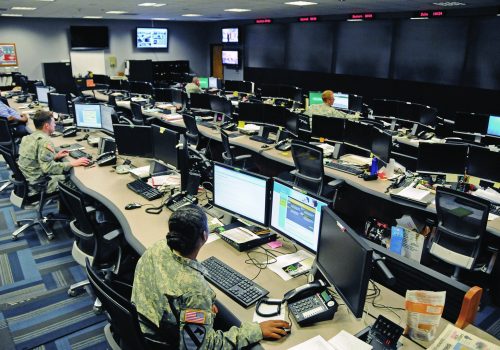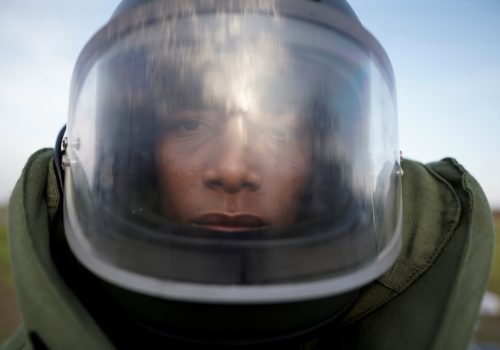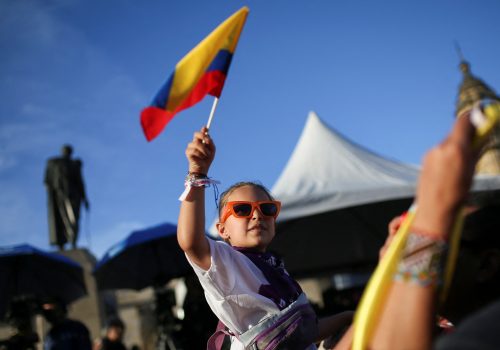Invest in our military relationship
During my final trip to Colombia as the Commander of US Southern Command (SOUTHCOM) in September 2021, I visited the Colombian Military Inclusive Rehabilitation Center. The facility was built by the Colombian and South Korean governments to commemorate the Colombian troops who sacrificed their lives for freedom on the Korean peninsula. I spoke with soldiers who bravely fought and lost limbs in battles against terrorist organizations like the Revolutionary Armed Forces of Colombia (FARC), FARC dissidents, the National Liberation Army (ELN), and drug trafficking groups such as Clan del Golfo. That visit solidified one profound truth: Colombia is relentlessly committed to playing a key role in regional and international security. It was true when our nations established diplomatic relations in 1822, it was true during the Korean War in 1950, and it’s as true as ever today.
In 2022, democracy is under assault from multiple threats around the world, including Russian President Vladimir Putin’s invasion of Ukraine, the People’s Republic of China’s (PRC) growing global malign ambitions, Iran, North Korea, terrorism, and the increased sophistication of transnational criminal organizations (TCOs).
Like-minded democratic nations must build ironclad security alliances based on trust to counter these threats and protect our populations. In Latin America and the Caribbean—our shared neighborhood—Colombia is one of the United States’ most trusted partners. The Colombian military works to enhance professionalism and war-fighting ability through a relentless focus on human rights and the ethical use of force in everything from education to training, exercises, and multinational operations. Hemispheric and global security benefit from the Colombian military’s highly skilled forces and the US-Colombia military security partnership. Now is the moment for our two militaries to further enhance the relationship in the ever-changing global security environment.
When I reflect on how far Colombia has come in recent decades, I’m impressed by our partner’s progress. As recently as the 1980s and 1990s, Colombia was mired in narcotics wars, Pablo Escobar was a household name, and the central government teetered on collapse. Today, while threats from narco-terrorists remain, Colombia is a key regional leader and security exporter. In its ongoing fight, the military has sustained an exceptionally high tempo while maintaining the trust and confidence of the population. For the past seven years, Colombia has led Operation Orion, a multinational, multi-domain (land, air, sea, and cyber) counter-narcotics operation. In 2021, Orion disrupted more than 200 metric tons of cocaine and captured more than 100 TCO aircraft and vessels, keeping drugs off Colombian and US streets and thus, saving lives. The Colombian Air Force annually participates in the US Air Force Red Flag exercise, and the US Air Force participates in the annual Colombian regional “Relampago-Lightening” and “Angel of the Andes” exercises.
Colombia supports its neighbors by responding to natural disasters caused by climate change. Following the 7.2-magnitude earthquake that struck Haiti in 2021, Colombia sent two Air Force planes transporting an urban search and rescue team and 12 tons of humanitarian aid, including food, cleaning supplies, and blankets. At the 2021 UN Climate Change COP26 summit in Glasgow, Colombia joined Costa Rica, Ecuador, and Panama to expand their maritime protected areas, partly to deter illegal, unreported, and unregulated fishing from PRC-flagged vessels.
Colombia’s transformation into a regional leader did not happen over- night. It has taken decades of sustained training, partnership, and collaboration. The US-Colombia Action Plan (USCAP), an outgrowth of the highly successful Plan Colombia launched in 2000, continues today. Through USCAP, Colombian soldiers, sailors, marines, and airmen, with modest assistance from the United States, train partners across Central and South America for security missions. Colombia has fully operationalized Spanish-language entry-level and advanced helicopter training schools for forces around the world. The US army once ran this training at Fort Rucker, Alabama, but Colombia has expanded it and made it world class.
I have toured Colombian facilities where helicopter pilot and maintenance training are conducted to NATO standards, emphasizing professionalism and self-sustainment at a fraction of what it would cost elsewhere. Colombia also inaugurated a NATO-certified demining course and deploys United Nations peacekeeping forces worldwide, demonstrating its commitment to global stability and humanitarian causes. As a result, the administration of President Joseph R. Biden has nominated Colombia to become a full Major non-NATO Ally.1Statement by Joseph R. Biden of the United States and President Iván Duque Márquez of the Republic of Colombia, US-Colombia Bicentennial Partnership, White House, March 10, 2022, https://www.whitehouse.gov/briefing-room/statements-releases/2022/03/10/joint-statement-by-president-joseph-r-biden-jr-of-the-united-states-and-president-ivan-duque-marquez- of-the-republic-of-colombia-u-s-colombia-bicentennial-partnership/.
The key to the Colombian military’s success boils down to one word: professionalism. Global military professionals recognize the Colombian Armed Forces (CAF) for their fighting ability and ethical use of force. The CAF understands the importance of professionalism in their ranks, from the commander-in-chief (the president) to the newest conscript. The Colombian military works hard every day to educate and train to the highest human rights standards, reinforcing professional behavior by awarding and promoting officers who uphold these standards and taking legal action against officers who violate them.
Colombian military officials understand that strong, professional, corruption-free institutions are the best bulwark against insecurity and instability. Among professional militaries, trust is the foundation to build the ethically-based military skills necessary to deter and defeat threats. Nations must invest sufficient resources in people, processes, and programs to build trusted security relationships.
I have met with all levels of Colombian officers and enlisted soldiers and found no nation more committed to education and professional development for its military personnel than the CAF. It often commits its funds to send commissioned and non-commissioned officers to attend US military academies, participates in SOUTHCOM’s Women, Peace, and Security Program, and engages in numerous regional military exercises. But today’s progress does not guarantee future success. Improvements in all militaries and alliances require a sustained commitment in resources and time, under- pinned by relentless self-assessment and investments in education, training, doctrine, exercises, and equipment to keep pace with evolving and growing threats. Military success also requires institutional professionalism with trusted processes that produce corruption-free procurement, budgets matched to strategic needs, and a balance between modernization and sustainment (keeping existing equipment ready to use).
To continue enhancing and accelerating the US-Colombia military relationship, we should:
- Reinvigorate the existing regional security architecture, put real substance into what it means to be a Major non-NATO ally, and develop new multinational security mechanisms. Considering global trends, are existing bilateral and multilateral exercises, pro- grams, and security mechanisms enough? For example, NATO partner-militaries annually participate in bilateral exercises and military-to-military programs in Latin America and the Caribbean. Why not combine efforts within a more robust policy framework? In 2021, SOUTHCOM sponsored a NATO conference to explore first steps in enhancing Western Hemisphere security. Policy makers should seize on these first steps and expand historical NATO global partnerships and other partnerships, such as the Inter-American Defense Board of the Organization of American States, to build professional armed forces and enhance mutual defense.
- Overhaul the US system of foreign military sales, financing, and US Department of Defense (DoD) security cooperation. Current systems and processes are inadequate for the tempo of conflict and competition the world now faces. They are under-resourced and often held hostage to annual budgeting exercises. When I was SOUTHCOM commander, I would often say, “why are we blocking our own field goals with respect to many of our security assistance programs?” To win in conflict and competition, we must be consistent, agile, and have an adequate level of investment. We must be on the field globally to compete and win; presence matters. We should not hold partner-nation militaries to higher standards than our own. The US Department of State (DOS) must lead for foreign assistance, but DoD security cooperation programs have a role alongside DOS. Programs should include sufficient flexibility to respond to the rap- idly changing security environment. Develop multi-year security cooperation programs with a designated floor that is not subject to annual reprogramming or the debilitating impacts of continuing resolutions. Congress plays a critical role and should develop oversight mechanisms that are not subject to yearly change and beholden to narrow political interests.
- Increase investment in Colombian and Latin America and Caribbean security cooperation programs. Consistent, long-term efforts are necessary. A strong and professional Colombian military is not enough. Given geographic proximity to the United States, security in Latin American and the Caribbean is intertwined with US national security, yet we severely underinvest in security assistance in our hemisphere. The Colombian military is in urgent need of modernization to upgrade its equipment. The best way to ensure stability in a rough neighborhood and push back on the malign influence of Russia, the PRC, and Iran is to focus on building our friends’ capacity to deal with conflict and crises.
- Significantly improve intelligence sharing; call it “Compartir Americas.” In the world of professional militaries, intelligence drives everything. Intel-sharing is built on trusted people, institutions, processes, and systems. While the US and Colombian militaries have made significant strides in sharing intel, we should ensure that our intelligence sharing equals that of our closest NATO partners. Anyone who claims what we do now is adequate has not operated in the byzantine, arcane, slow, technologically-backward world of bilateral and multilateral intel-sharing. The crisis in Ukraine illustrates the importance of vigorous intelligence sharing.
- Keep pace with emerging threats. Develop a US approach for foreign cyber assistance that brings together US and partner nation interagency teams and is strong and flexible enough to respond to emergent needs. Only recently has cybersecurity assistance been recognized as a valid area for security cooperation. The Colombian military and SOUTHCOM are working together to combat malign cyber activity and disinformation campaigns from Russia and Venezuela. Such cybersecurity collaboration is a good start, but the additional authority and capacity to conduct bilateral training, subject matter expert exchanges, information sharing, and operations, all at the speed of relevance, is needed.
- Double the US global international military education and training and exercise budget and authorize human rights training billets at all US combatant commands. Now is the time to increase investments in professionalism as the bedrock of our global partnerships.
These ideas would benefit Colombia, the United States, and the world. We must put tangible action behind our stated goal of strengthening partnerships. We must learn lessons from Putin’s war in Ukraine and apply those lessons globally, including in our Western Hemisphere neighborhood, put- ting programs and processes in place that contribute to regional stability and security.
During my final trip to Colombia, I visited the Colombian Army Military Academy. The academy’s front entrance had three words: “Patria, Honor, y Lealtad”—homeland, honor, and loyalty. For 200 years, Colombia and the United States have developed professional militaries and institutions that are now the bulwark of our stable democracies. Devoting adequate and consistent investment in time, people, and resources to deter and defeat today’s threats will ensure our democracies endure for another two centuries. Democracy must deliver to all people. Professional militaries are a fundamental part of this.
* * *
Admiral Faller is a retired four-star US Navy admiral, former commander of the US Southern Command from 2018 to 2021, and former chief of legislative affairs for the US Department of the Navy, the top Navy liaison with Congress. He is currently a distinguished fellow at the Atlantic Council’s Adrienne Arsht Latin America Center and Scowcroft Center for Strategy and Security.
Related Allies essays
A roadmap for a new type of engagement
This moment opens the door for a reimagined US partnership with Colombia based on a shared vision for a more prosperous, inclusive, and sustainable future.
Related program

The Adrienne Arsht Latin America Center broadens understanding of regional transformations and delivers constructive, results-oriented solutions to inform how the public and private sectors can advance hemispheric prosperity.
Image: Colombian national policemen attend the inauguration of an international training school in Pijao province, Tolima May 21, 2009. REUTERS/John Vizcaino (COLOMBIA MILITARY SOCIETY) - GM1E55M0J5W01



